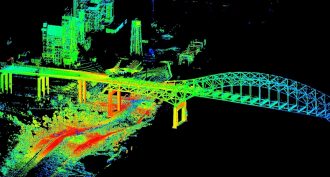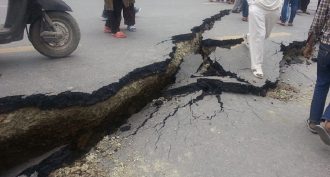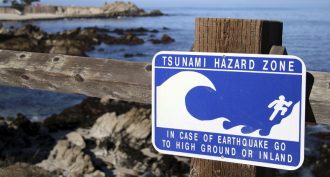MS-PS4-1
Use mathematical representations to describe a simple model for waves that includes how the amplitude of a wave is related to the energy in a wave.
-
 Oceans
OceansExplainer: What is a tsunami?
Earthquakes and landslides can create huge waves that travel across oceans.
-
 Tech
TechGround-thumping cheers help scientists
Eager to test new sensors before the next ‘big one,’ earthquake scientists make use of a predictable source of ground-shaking: football fans.
-
 Tech
TechMaking cents of sounds
Some people give up when a vending machine rejects their money. But one student decided to turn his frustration into inspiration. Through research, he showed how to identify coins by the sounds they make.
-
 Tech
TechExplainer: What are lidar, radar and sonar?
Radar, sonar and lidar and are three similar technologies. Each relies on the echoing of waves — radio, sound or light waves — to detect objects.
-
 Tech
TechLaser vision reveals hidden worlds
From discovering ancient ruins to forecasting climate change, the laser mapping technology called lidar is changing many fields of science.
-
 Earth
EarthNepal earthquake offers hints of worse to come
The magnitude 7.8 earthquake that crumbled much of Nepal’s capital city could be overshadowed by larger future earthquakes along the Himalayas, scientists say.
-
 Space
SpaceRadio telescope picks up signals from intelligent life
Astronomers tracked down the source of perytons, mysterious radio bursts. They had at first seemed to emanate from Earth’s atmosphere. Probing now suggests the life forms responsible had a penchant for leftovers.
-
 Earth
EarthThe quake that shook up geology
North America’s biggest earthquake struck 50 years ago. Here’s what science has learned about Earth since the 1964 Great Alaskan Earthquake.
By Beth Geiger -
 Earth
EarthExplainer: Telling a tsunami from a seiche
Waves that hit coastlines with ferocious power, tsunamis are one of the planet’s most devastating forces of nature. And seiches: They’re tsunamis little, but still potentially deadly, cousins.
-
